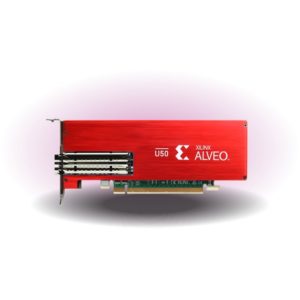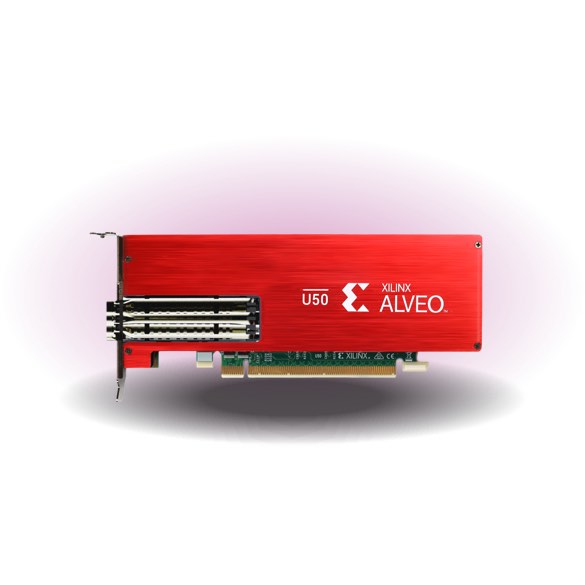 Today Xilinx launched the new Alveo U50 data center accelerator card, the industry’s first low profile adaptable accelerator with PCIe Gen 4 support. Designed for the datacenter, the Alveo U50 is uniquely designed to supercharge a broad range of critical compute, network and storage workloads, all on one reconfigurable platform.
Today Xilinx launched the new Alveo U50 data center accelerator card, the industry’s first low profile adaptable accelerator with PCIe Gen 4 support. Designed for the datacenter, the Alveo U50 is uniquely designed to supercharge a broad range of critical compute, network and storage workloads, all on one reconfigurable platform.
Ever-growing demands on the data center are pushing existing infrastructure to its limit, driving the need for adaptable solutions that can optimize performance across a broad range of workloads and extend the lifecycle of existing infrastructure, ultimately reducing TCO,” said Salil Raje, executive vice president and general manager, Data Center Group, at Xilinx. “The new Alveo U50 brings an optimized form factor and unprecedented performance and adaptability to data center workloads, and we continue to build out solution stacks with a growing ecosystem of application partners to deliver previously unthinkable capabilities to a range of industries.”
The Alveo U50 provides customers with a programmable low profile and low-power accelerator platform built for scale-out architectures and domain-specific acceleration of any server deployment, on-premise, in the cloud and at the edge. To meet the challenges of emerging dynamic workloads such as cloud microservices, Alveo U50 delivers between 10-20x improvements in throughput, latency and power efficiency. For accelerated networking and storage workloads, the U50 card helps developers identify and eliminate latency and data movement bottlenecks by moving compute closer to the data.
Powered by the Xilinx UltraScale+ architecture, the Alveo U50 card is the first in the Alveo portfolio to be packaged in a half-height, half-length form factor and low 75-Watt power envelope. The card features high-bandwidth memory (HBM2), 100 gigabit per second (100 Gbps) networking connectivity, and support for the PCIe Gen 4 and CCIX interconnects. By fitting into standard PCIe server slots and using one-third the power, the Alveo U50 significantly expands the scope in which adaptable acceleration can be deployed to unlock dramatic throughput and latency improvements for demanding compute, network and storage workloads. The 8GB of HBM2 delivers over 400 Gbps data transfer speeds and the QSFP ports provide up to 100 Gbps network connectivity. The high-speed networking I/O also supports advanced applications like NVMe-oF solutions (NVM Express over Fabrics™), disaggregated computational storage and specialized financial services applications.
IBM is excited about the expansion of the Xilinx Alveo portfolio with the addition of the Alveo U50 adaptable accelerator card,” said Steve Fields, Chief Architect for IBM Power Systems. “We believe the combination of low-profile form-factor, HBM2 memory performance, and PCIe Gen 4 speed to interface with IBM Power processors will enable the OpenPOWER ecosystem to provide cutting edge adaptable acceleration solutions.”
From machine learning inference, video transcoding and data analytics to computational storage, electronic trading and financial risk modeling, the Alveo U50 brings programmability, flexibility, and high throughput and low latency performance advantages to any server deployment. Unlike fixed architecture alternatives, the software and hardware programmability of the Alveo U50 allows customers to meet ever-changing demands and optimize application performance as workloads and algorithms continue to evolve.
Alveo U50 accelerated solutions deliver significant customer value across a range of applications, including:
- Deep learning inference acceleration (speech translation): delivers up to 25x lower latency, 10x higher throughput and significantly improved power efficiency per node compared to GPU-only for speech translation performance
- Data analytics acceleration (database query): running the TPC-H Query benchmark, Alveo U50 delivers 4x higher throughput per hour and reduced operational costs by 3x compared to in-memory CPU2
- Computational storage acceleration (compression): delivers 20x more compression/decompression throughput, faster Hadoop and big data analytics, and over 30 percent lower cost per node compared to CPU-only nodes3
- Network acceleration (electronic trading): delivers 20x lower latency and sub-500ns trading time compared to CPU-only latency of 10us4
- Financial modeling (grid computing): running the Monte Carlo simulation, Alveo U50 delivers 7x greater power efficiency compared to GPU-only performance5 for a faster time to insight, deterministic latency and reduced operational costs.
The forthcoming 2nd Gen AMD EPYC processor is ideally suited for data center-first accelerators like the Alveo U50 that combine compute, network and storage acceleration all on the same platform,” said Raghu Nambiar, vice president & CTO of application engineering at AMD. “Taking advantage of AMD’s leadership, first x86 server-class PCIe 4.0 CPU, the Alveo U50 will be the industry’s first adaptable accelerator card with PCIe 4.0 support. We look forward to working with Xilinx to combine the benefits of AMD EPYC based solutions with Alveo acceleration to hyperscale and enterprise customers.”




